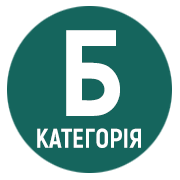THE IMAGE OF THE OTHER IN A FANTASY NOVEL OF THE FIRST DECADES OF THE XXI CENTURY: MASKS AND ROLES
DOI:
https://doi.org/10.32782/2412-933X/2024-XXII-4Keywords:
fantasy, Otherness, degree, paradigm, concept, transformationAbstract
The consistent growth of the role of the Other in XXI century fantasy prose is due to the increased attention paid to it in the literary process and the new configuration of the basic fantasy conflict. New roles and masks of Otherness are installed here, in particular, in socio-cultural, national, virtual-historical, gender discourses and imitation of the religious. The reasons for the popularity and nature of the implementation, evolution of the figure of the Other in fantasy novel of 2000– 2020 did not become the object of research, despite the obvious relevance of the problem. The aim of our article is to identify for the first time the key parameters, vectors of plot roles and masks of the Other in the corpus of the fantasy metagenre of the first decades of the XXI century. Key here are highlighting the logic of the development of the concept of the Other in the modern fantasy field and the accompanying thematic paradoxes of the problem (advantages as weaknesses, etc.), motivating the phenomenon of second-degree Otherness in connection with the intensive heterogenization of the corresponding thematic clusters of the metagenre, as well as analyzing the influence of extra-artistic factors on the transformation of the spectrum of Otherness in contemporary fantasy prose. In parallel with the tendency to highlight the category of subjective boundary, the concept of the Other in XXI century fantasy art tends towards limitation, distance (as im-morality), paradoxicality, and sometimes expresses the paradox of the combination of strength and weakness in the perception of the environment. A prominent place in the context of the conversation about Otherness in modern fantasy belongs to gender, variably traced in the feminine plane. The parameter of Otherness is a basic element in the fantasy reception of socio-cultural events and geopoetics, as well as in synthetic plot-image constructs of the metagenre (such as the «home for peculiar children»). Such synthetic constructs acquire additional artistic properties, ethical markers, and are also characterized by the amplitude of interpretation during their further functioning. The above-mentioned questions deserve further comprehensive study, which will allow for a deeper understanding of the patterns of development of fantasy art in the XXI century.
References
Гурдуз А. І. Український фентезійний роман 2000–2020 рр. У слов’янському, англійському й американському контекстах: особливості національного міфотворчого коду : монографія. Миколаїв : Іліон, 2023. 528 с.
Собуцький М. Розширення прав і повноважень лідерок у чарівному світі фантастичних істот. Наукові записки НаУКМА. Історія і теорія культури. 2024. № 7. С. 148–154. DOI: 10.18523/2617-8907.2024.7.148-154.
Bradbury R. The Martian Chronicles: The Complete Edition. Burton: Subterranian Press, 2009. 745 p.
Driggers T. Queering Faith in Fantasy Literature: Fantastic Incarnations and the Deconstruction of Theology / series ed. preface by B. Attebery, D. Fimi, M. Sangster. London: Bloomsbury Academic, 2022. XII, 235 p.
Ekman S. Urban Fantasy: A Literature of the Unseen. Journal of the Fantastic in the Arts. 2016. Vol. 27. No 3 (97). P. 452–469.
Genette G. Palimpsests: Literature in the Second Degree / transl. by C. Newman, C. Doubinsky. Lincoln; London: University of Nebraska Press, 1997. 491 p.
Guanio-Uluru L. Ethics and Form in Fantasy Literature: Tolkien, Rowling and Meyer. New York: Palgrave Macmillan, 2015. X, 261 p.
James E, Mendlesohn F. Introduction. The Cambridge Companion to Fantasy Literature / ed. E. James, F. Mendlesohn. New York: Cambridge University Press, 2012. P. 1–4.
Kavadlo J. X-Istential X-Men: Jews, Supermen, and the Literature of Struggle. X-Men and Philosophy. New Jersey: Wiley, 2009. P. 38–49.
Manlove C. N. The Fantasy Literature of England. Basingstoke: Palgrave, 1999. 222 p.
Mendlesohn F. Rhetorics of Fantasy. Middletown, Connecticut: Wesleyan University Press, 2008. XXV, 306 p.
Rank O. The Myth of the Birth of the Hero: A Psychological Exploration of Myth / transl. by G. C. Richter, E. J. Lieberman. Baltimore: Johns Hopkins University Press, 2015. XLVIII, 149 p.






